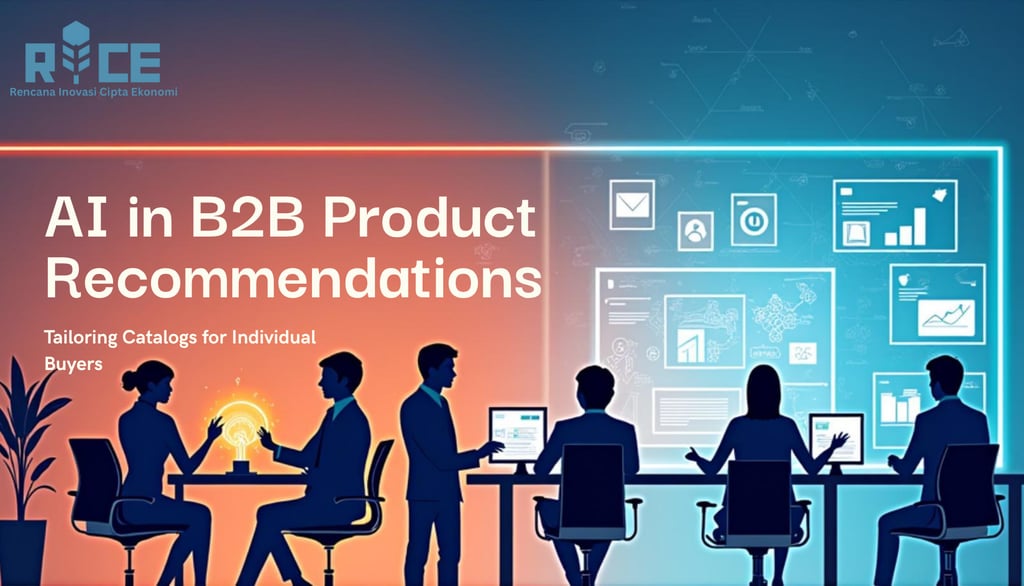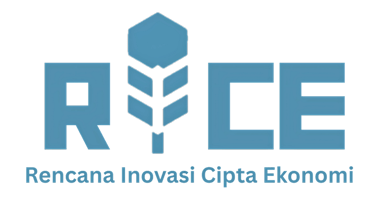AI in B2B Product Recommendations: Tailoring Catalogs for Individual Buyers
Explore how AI is revolutionizing B2B product recommendations, tailoring catalogs to individual buyers, boosting sales, and enhancing customer expiriences.
INDUSTRIES
Rice AI (Ratna)
6/14/20259 min baca


Introduction
Imagine a B2B buyer navigating a sprawling digital catalog, seeking specific industrial components for their manufacturing line. Instead of sifting through thousands of irrelevant products, an AI-powered system instantly suggests a curated list tailored to their company’s needs, past purchases, and even budget constraints. This is the power of AI in B2B product recommendations—a transformative force redefining how businesses engage with their buyers. For readers of an AI, data analytics, and digital transformation consultancy website, understanding this technology is critical to advising clients on staying competitive in a rapidly evolving market.
This article explores how AI tailors product catalogs for individual B2B buyers, diving into the technologies, benefits, challenges, and future trends. Spanning approximately 2200 words for a 9-minute read, it draws exclusively from trusted sources like industry reports, academic journals, and expert publications. With real-world case studies, insightful analysis, and a balanced perspective, it aims to equip consultants with actionable knowledge to guide digital transformation strategies. How does AI achieve this level of personalization, and what does it mean for B2B commerce? Let’s dive in.
The Evolution of B2B Product Recommendations
From Static Catalogs to Dynamic Personalization
Historically, B2B product catalogs were static, often printed or hosted online as generic lists segmented by broad categories like industry or product type. Sales teams manually curated recommendations, a time-consuming process that couldn’t scale for diverse buyer needs (Gartner, 2023). Today, AI revolutionizes this by enabling dynamic, real-time personalization. Unlike B2C, where recommendations focus on individual consumers, B2B personalization considers organizational contexts—such as company size, industry, or procurement history—making it more complex but highly impactful (McKinsey & Company, 2024).
AI-driven systems analyze vast datasets to suggest products tailored to each buyer’s unique profile. For example, a construction firm might receive recommendations for heavy-duty equipment based on past orders, while a small retailer sees suggestions for cost-effective supplies (eWiz Commerce, 2023). This shift from one-size-fits-all to individualized catalogs enhances buyer efficiency and strengthens vendor relationships, addressing the need for precision in B2B transactions.
Why Personalization Matters in B2B
Personalization in B2B isn’t just a nice-to-have—it’s a competitive necessity. Research shows 50% of B2B buyers view personalization as a top priority, and 48% are willing to spend more with vendors offering tailored experiences (Klevu, 2023). Unlike B2C buyers, who often make impulse purchases, B2B buyers engage in longer, research-intensive decision cycles involving multiple stakeholders. AI streamlines this by presenting relevant products upfront, reducing friction and boosting satisfaction (Salesforce, 2024). This is particularly crucial in industries with high stakes, such as healthcare or manufacturing, where accuracy and compliance are paramount.
How AI Powers Tailored B2B Recommendations
Core Technologies Behind AI Recommendations
AI in B2B product recommendations relies on a suite of advanced technologies, each playing a distinct role in personalization:
Machine Learning (ML): ML algorithms, such as collaborative and content-based filtering, analyze historical data to predict buyer preferences. Collaborative filtering identifies patterns across similar buyers, while content-based filtering matches products to a buyer’s past behavior (DCKAP, 2024).
Natural Language Processing (NLP): NLP enables systems to interpret complex buyer queries, like “sustainable packaging for food industry under $1000,” delivering precise results even with misspellings or vague terms (Klevu, 2023).
Predictive Analytics: By forecasting future needs based on trends and seasonality, predictive analytics suggests products before buyers explicitly search for them, such as restocking supplies during peak seasons (commercetools, 2023).
Real-Time Data Processing: AI processes clickstream data, browsing patterns, and live interactions to adjust recommendations instantly, ensuring relevance during a buyer’s session (Constructor, 2024).
These technologies work together to create a seamless, intuitive experience, mimicking the expertise of a seasoned sales representative but at scale.
Advanced AI Techniques in B2B Recommendations
AI in B2B product recommendations leverages a variety of advanced techniques to handle the complexity and specificity of business-to-business transactions:
Machine Learning Algorithms: These include collaborative filtering, which recommends products based on similar buyers' behaviors, and content-based filtering, which suggests products similar to those a buyer has previously purchased or shown interest in. Hybrid approaches combine both methods for more accurate recommendations, particularly useful in B2B where buyer behavior can vary widely by industry.
Natural Language Processing (NLP): NLP allows AI systems to understand and interpret complex buyer queries, even when they are phrased in natural language. For example, a buyer searching for "sustainable packaging solutions for electronics" can receive highly relevant results without needing to know specific product codes, enhancing user experience in complex procurement processes.
Predictive Analytics: By analyzing historical data and identifying patterns, predictive analytics can forecast future product needs. For instance, if a buyer typically reorders certain supplies every six months, the system can proactively suggest restocking as the date approaches, improving operational efficiency.
These techniques enable AI to provide recommendations that are not only personalized but also contextually aware, considering factors like industry regulations, company size, and past interactions, which is critical for B2B buyers with diverse needs.
Mechanisms of Catalog Tailoring
AI tailors catalogs through several mechanisms, each addressing different facets of the B2B buying process:
Data-Driven Insights: AI aggregates data from CRM systems, purchase histories, and external sources like industry trends to build detailed buyer profiles (eWiz Commerce, 2023).
Real-Time Personalization: Recommendations adjust dynamically as buyers interact with the platform, such as suggesting complementary products during checkout (Constructor, 2024).
Account-Based Customization: AI tailors catalogs to specific accounts, reflecting negotiated pricing, preferred product categories, or contract terms unique to each client (commercetools, 2023).
Contextual Understanding: Using NLP, AI interprets the intent behind searches, ensuring recommendations align with the buyer’s goals, such as cost savings or sustainability (Klevu, 2023).
These mechanisms enable AI to deliver hyper-relevant suggestions, transforming generic catalogs into personalized procurement tools.
Real-World Applications: Case Studies
Princess Auto: Boosting Order Values
Princess Auto, a Canadian retailer of industrial and agricultural equipment, implemented AI-powered recommendations on its product detail pages (PDPs) and checkout process. By analyzing buyer behavior, the system suggested complementary products, such as tools or accessories, leading to a significant increase in average order value (AOV) (Constructor, 2024). This case highlights AI’s ability to drive upsell opportunities in B2B settings, particularly for retail-focused B2B companies.
Verktøy: Enhancing Product Discovery
Verktøy, a Norwegian supplier of DIY and professional tools, integrated Klevu’s Smart Search to improve product discovery for its B2B clients. The AI system handled misspellings, understood buyer intent, and delivered precise results, even for niche queries like “cordless drills for heavy-duty construction.” This resulted in faster procurement and higher customer satisfaction (Klevu, 2023), demonstrating AI’s effectiveness in enhancing search functionality for B2B buyers.
ServiceNow: Enhancing Cross-Sell Success
ServiceNow, a leading digital workflow company, integrated AI into its account management processes to analyze CRM usage logs, add-on adoption rates, and vertical-specific workflows. By doing so, they were able to recommend tailored solutions such as the Governance, Risk, and Compliance (GRC) module for financial services clients with high compliance ticket volumes, or HR-focused modules for companies with frequent employee provisioning needs. This resulted in a 25% increase in cross-sell success for mid-market accounts and a notable lift in average deal size for expansions, ultimately raising long-term customer lifetime value (LTV) (Gripped, 2025).
These examples illustrate how AI adapts to diverse B2B contexts, from retail to enterprise software, delivering measurable results and showcasing its versatility across industries.
A.F. Blakemore: Streamlining Wholesale
A.F. Blakemore, a UK wholesale distributor, adopted Klevu’s AI platform to personalize product recommendations for its B2B customers, such as independent retailers. By tailoring suggestions based on purchase history and regional demand, the company improved order efficiency and strengthened client relationships (Klevu, 2023).
These examples illustrate how AI adapts to diverse B2B contexts, from retail to wholesale, delivering measurable results.
Benefits of AI-Driven B2B Recommendations
Driving Revenue Growth
AI enhances revenue through upselling and cross-selling. For instance, suggesting add-ons like maintenance kits alongside equipment purchases increases order sizes. A report by Algolia found that 86% of B2B decision-makers adopt AI search platforms to gain market share, citing revenue growth as a key driver (Algolia, 2023). Personalized recommendations also boost conversion rates by presenting buyers with products they’re more likely to purchase.
Moreover, according to Digital Commerce 360, 62% of senior B2B marketers cite AI and machine learning advancements as top investment priorities over the next 12 to 24 months, highlighting the growing recognition of AI's potential in driving business growth (Digital Commerce 360, 2025). This statistic underscores the strategic importance of AI in B2B, particularly for companies looking to stay ahead in competitive markets.
Improving Customer Satisfaction
Tailored catalogs reduce the time buyers spend searching, enhancing their experience. Klevu’s research indicates 50% of B2B buyers prioritize personalization, and 48% are more loyal to vendors offering it (Klevu, 2023). By aligning recommendations with buyer needs, AI fosters trust and long-term partnerships, which is crucial for B2B relationships that often involve long-term contracts and repeat business.
Enhancing Operational Efficiency
AI automates recommendation processes, freeing sales teams to focus on strategic tasks like relationship-building. It also provides insights into buyer preferences, informing inventory management and product development (eWiz Commerce, 2023). For example, identifying high-demand products helps vendors optimize stock levels, reducing costs and improving supply chain efficiency, which is particularly beneficial for B2B companies with complex logistics.
Competitive Differentiation
In a crowded B2B market, personalization sets companies apart. McKinsey reports that 71% of B2B buyers expect personalized interactions, and those delivering them achieve 20-30% higher customer acquisition rates (McKinsey & Company, 2024). AI enables vendors to meet these expectations consistently, providing a competitive edge in industries where buyer loyalty can significantly impact revenue.
Challenges and Considerations
Data Quality and Compliance
AI’s effectiveness depends on high-quality data. Incomplete or inaccurate datasets can result in irrelevant recommendations, eroding trust. Additionally, handling sensitive B2B data, such as procurement budgets, requires compliance with regulations like GDPR, demanding robust security measures (DCKAP, 2024).
System Integration
Integrating AI with legacy systems, such as ERP or eCommerce platforms, can be complex and costly, and may require significant technical expertise. For example, syncing real-time inventory data with with recommendation engines requires seamless middleware (commercetools, 2023). Smaller businesses may struggle with resource constraints.
Algorithmic Bias
AI risks perpetuating biases if training data reflects historical inequities, such as favoring certain suppliers over others. Regular audits and ethical AI practices are essential to ensure fair recommendations (DCKAP, 2024).
Buyer Resistance
Some B2B buyers, particularly those accustomed to traditional sales interactions, may resist AI-driven recommendations, fearing a loss of human expertise. Transparent communication about AI’s role as a supportive tool can mitigate this (Salesforce, 2024).
Analysis: Strategic Implications for B2B Leaders
AI’s ability to tailor product catalogs offers a strategic advantages, but success requires more than technology adoption. Consultants must guide clients on building robust data ecosystems, ensuring high-quality, compliant datasets. Investing in scalable platforms like those from Klevu or Constructor enables seamless integration, while Addressing ethical concerns builds and addressing ethical concerns builds trust.
The case studies reveal AI’s versatility, from boosting AOV to streamlining wholesale, but outcomes vary by implementation. For instance, Princess Auto’s success relied on targeted upselling, while Verktøy prioritized search accuracy, suggesting. This suggests tailored strategies based are needed depending on business models.
The data is clear: personalization drives revenue and loyalty, but B2B buyers also demand transparency and accuracy—40% prioritize accurate stock information (Digital Silk, 2024). AI’s ability to meet these expectations makes AI a cornerstone of digital transformation, aligning with consultancy goals of driving efficiency and innovation.
Future Outlook: Trends Shaping AI in B2B Recommendations
Hyper-Personalization
The future of AI lies in hyper-personalization, where recommendations account for granular details like individual stakeholder preferences within a company or real-time market shifts. For instance, suggesting products based on a buyer’s role—such as a maintenance manager versus a procurement officer—could enhance precision (DCKAP, 2024).
Conversational AI and Voice Search
Conversational AI, via chatbots or voice assistants, will enable buyers to interact with catalogs naturally, such as saying, “find me biodegradable packaging for retail.”” This streamlines procurement, especially for mobile users (Klevu, 2023).
Visual and IoT-Driven Recommendations
Visual search, allowing buyers to upload images to find products, and IoT integration, such as sensors detecting low inventory, will create proactive recommendations. For example, a factory’s IoT system could trigger reorder suggestions when parts are nearing depletion (DCKAP, 2024).
Ethical AI and Sustainability
As buyers prioritize sustainability, AI will recommend eco-friendly products aligned with corporate values. Ethical AI frameworks will also gain traction, ensuring transparency and fairness in data use, a key concern for B2B clients (commercetools, 2023).
Best Practices for Implementing AI in B2B Product Recommendations
To successfully implement AI-driven product recommendations in B2B, consider the following best practices:
Centralize Customer Data: Ensure that customer data from all touchpoints is integrated and accessible to the AI system. This includes CRM data, marketing automation data, and product usage analytics, ensuring a holistic view of buyer behavior.
Focus on Role-Specific Value Propositions: Tailor recommendations to the specific roles within the buying organization, such as finance, IT, or operations, each with their own priorities and concerns, addressing the multi-stakeholder nature of B2B decisions.
Use Guardrails and Human Oversight: Implement checks to prevent illogical or inappropriate recommendations. Human oversight can help refine AI outputs and ensure they align with business goals, particularly in high-stakes industries like healthcare.
Deploy in Stages: Start with a pilot program to test AI recommendations, validate their effectiveness, and then scale across the organization. This approach helps mitigate risks and allows for iterative improvement, ensuring a smooth transition for both buyers and vendors.
By following these best practices, B2B companies can maximize the benefits of AI while minimizing potential pitfalls, aligning with the strategic goals of digital transformation consultants.
Conclusion
AI is reshaping B2B product recommendations, transforming generic catalogs into personalized tools that drive revenue, efficiency, and loyalty. From Princess Auto’s upsell success to ServiceNow’s cross-sell achievements, real-world applications demonstrate AI’s potential across industries. Yet, challenges like data privacy, integration, and bias require strategic navigation.
For consultants advising on digital transformation, AI-driven personalization offers a clear path to competitive advantage, aligning with client goals of innovation and growth. Looking ahead, trends like hyper-personalization, conversational AI, and cross-vendor insights promise even greater precision, provided businesses invest in robust data and ethical practices. This subtle perspective underscores a future-first mindset, encouraging B2B leaders to embrace AI thoughtfully to unlock its full potential.
References
Algolia. (2023). AI search emerges as the cornerstone of digital-first B2B eCommerce strategy. https://www.algolia.com/about/news/algolia-report-ai-search-emerges-as-the-cornerstone-of-digital-first-b2b-ecommerce-strategy
commercetools. (2023). Partner Insights: Smart Product Recommendations for B2B. https://commercetools.com/blog/partner-insights-smart-product-recommendations-for-b2b
Constructor. (2024). Ecommerce Recommendations Guide. https://constructor.io/blog/ecommerce-recommendations-guide/
DCKAP. (2024). Enhance Product Recommendations with AI. https://www.dckap.com/commerce/blog/enhance-product-recommendations-with-ai/
Digital Silk. (2024). Top B2B eCommerce Trends. https://www.digitalsilk.com/digital-trends/top-b2b-ecommerce-trends/
eWiz Commerce. (2023). 8 ways AI is revolutionizing B2B product catalog management. https://www.ewizcommerce.com/blog/8-ways-ai-is-revolutionizing-b2b-product-catalog-management/
Gartner. (2023). The Future of B2B Sales: AI-Driven Personalization.
Klevu. (2023). Understanding the Modern-Day B2B Buyer. https://www.klevu.com/discovered/magazine/understanding-the-modern-day-b2b-buyer/
McKinsey & Company. (2024). The power of personalization in B2B e-commerce. https://www.mckinsey.com/capabilities/growth-marketing-and-sales/our-insights/the-power-of-personalization-in-b2b-e-commerce
Salesforce. (2024). State of the Connected Customer. https://www.salesforce.com/content/dam/web/en_us/www/documents/research/State-of-the-Connected-Customer.pdf
#AI #B2B #DigitalTransformation #Personalization #MachineLearning #NLP #Ecommerce #Innovation #TechTrends #DailyAIIndustry
RICE AI Consultant
Menjadi mitra paling tepercaya dalam transformasi digital dan inovasi AI, yang membantu organisasi untuk bertumbuh secara berkelanjutan dan menciptakan masa depan yang lebih baik.
Hubungi kami
Email: consultant@riceai.net
+62 822-2154-2090 (Marketing)
© 2025. All rights reserved.


+62 851-1748-1134 (Office)
IG: @riceai.consultant
